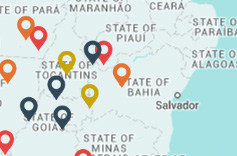Global Justice
Provisional Detainment and Mass Incarceration in Rio de Janeiro
Rio de Janeiro
Objetivos e público prioritário
To push public policies that guarantee the rights of provisionally detained persons in Rio de Janeiro and strengthen initiatives that seek to reverse the current trend of mass-incarceration and hardening of the penal framework. The initiative also looks to map the serving of provisional detainment sentences in Rio da Janeiro, in order to verify access to the justice system; the activity of criminal justice organs; and the conditions at detention units.
Main activities
– Monitoring visits to prison units that hold provisional detainees. Data from the monitoring will be systematized in reports that will include information about the general aspects of the detainment conditions;
– Meetings with the Public Defender;
– Creation of a thematic newsletter about the roles of the Judiciary and Public Prosecutor’s Office in the increased rate of provisional detainment and the maintenance of illegal detentions, to aid in advocacy against the abusive use of provisional detainment;
– A seminar to present the final report on the “Provisional Detainment Situation in Rio de Janeiro”;
– A public hearing in the Rio de Janeiro Legislative Assembly on the topic of Provisional Detainment in Rio de Janeiro;
– A thematic meeting on Provisional Detainment at the OAS’ Inter-American Commission of Human Rights in Washington D.C.
Context
In terms of criminal and penitentiary policy, Brazil has advanced very little in the guarantee of the rights of persons deprived of liberty. Inversely, mass-incarceration, overcrowding, degrading conditions in prisons, torture, institutional violence and arbitrary and illegal arrests are permanent characteristics of imprisonment units in Brazil. As a response to the punitive social clamor, the police, the Judiciary and the Public Prosecutor’s Office have undertaken a selective policy of mass-incarceration that preferentially targets poor and black populations. In this context, the banalization of provisional detainment worsens the already alarming numbers of prisoners in Brazil and ought to be the target of our actions.
In relation to the problem of overcrowding, the construction of more prisons and opening of more space for inmates has been the only solution offered as necessary by the public authorities.
A few legislative advancements, such as the recent alteration to the cautionary measures regime within the penal sphere and initiatives such as on-site, collective legal assistance by the CNJ have not been sufficient to produce structural changes within this setting. Insufficient legal assistance worsens overcrowding conditions and illegal imprisonments even more, by not guaranteeing the effective right to a legal defense to which provisional detainees are entitled.
About the organization
Global Justice is a non-governmental human rights organization whose mission is the protection and promotion of human rights and the strengthening of civil society and democracy. Global Justice has been active in several Brazilian states since 1999 and has developed activities at the national, regional and international levels. The organization divides itself among four major areas: Institutional Violence and Public Safety; Human Rights Defenders; Economic, Social and Cultural Rights; Communications. Each of these programs at Global Justice operates according to its five strategies of action: Research and documentation; strategic litigation; communication; training; and advocacy.
Partnerships
Rio de Janeiro State Mechanism for Prevention and Combat of Torture (MEPCT/RJ) – an organ created through state law no. 5778/2010, passed by the Rio de Janeiro Legislative Assembly (ALERJ), whose mission is to plan, realize and manage periodic and regular visits to incarceration units.
Results
Global Justice monitored preliminary hearings and visited prisons in the state of Rio de Janeiro. The selectivity of the Brazilian penal system is one of the noteworthy points found in the project’s concluding document. The final report shows that black and poor young people in many cases spend months or years in pre-trial detention. The organization reviewed the implementation of preliminary hearings. They are considered a significant effort to decrease mass incarceration but still have a long way to go. The percentage of people returned to freedom are still unsatisfactory.
Report “When freedom is an exception” (Portuguese).
Funding Line
Criminal Justice / Rio de Janeiro e São Paulo (2014)
Year
-
Total Granted
R$ 490,700
Duration
24 months
Main Themes
Guaranteeing the rule of law and criminal justice






